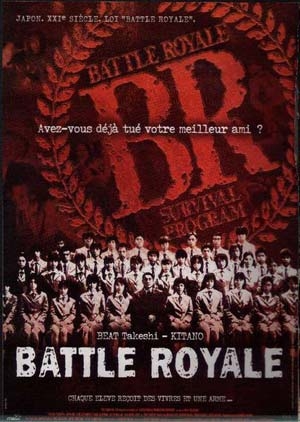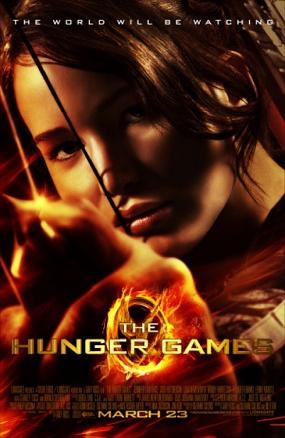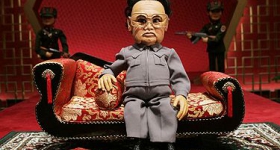Hollywood's next likely blockbuster, The Hunger Games, is set to open this Friday, March 23. This work is unique from past remakes or adaptations of Asian stories in that its creator denies any knowledge of the classic Japanese book (1999) and movie Battle Royale (2000), with which it shares extraordinary parallels.
Both movies feature a corrupt totalitarian government that places children on an isolated island to fight brutally to the death using weapons packs, until one last winner emerges. They implant tracking devices into the children and fill the island with cameras, which are observed by a control room that airs the competition to the general population. A female protagonist ultimately triumphs with the help of a boy with whom she develops a relationship. Author Suzanne Collins claims she never heard of the Battle Royale book or movie prior to writing The Hunger Games in 2008, and claims that she came up with the ideas independently after watching late night television and clips of the Iraq War. Maybe, maybe not. Collins has already profited handsomely from her Hunger Games trilogy of books, which have been US bestsellers for the past few years.

This isn't the first time Hollywood has made minor modifications on an Asian story and marketed it as a novel piece of art. Akira is currently being remade and re-set in neo-New York. The screenwriter for The Departed won an Oscar for basically translating the film Infernal Affairs into English, and changing the setting from Hong Kong to Boston. Aside from a few plot and character changes, many of the scenes in The Departed were direct scene-for-scene copies of the Asian film, including literal translations of some jokes. At least The Departed gave some credit to Infernal Affairs as a remake and has the excuse of paying homage. Though, a general question remains of the American public’s awareness of how many recent Hollywood films have been remakes of Asian movies, or how even a popular American television show like Wipeout is a remake of the popular decades-long Japanese show. Related to this, I found it interesting that a recent CNN teaser article had this to say about The Hunger Games:
Casting the right actors is imperative when adapting a novel for the big screen ... It's no secret fans want popular characters to look a certain way, specifically how they envisioned them while they were reading the book.
Wow, you couldn't make this stuff up. There's an irony in their emphasis on staying true to
the original characters while so many whitewashing casting practices and remakes persist.
Suzanne Collins's claims that Battle Royale had no influence on her books and its film adaptation is a major step back from recent remakes of Asian stories because, in those cases, at least there was a minor acknowledgement to the original characters or stories from which they were adapted. Even in recent whitewashing cases like 21 or The Last Airbender, at least the fans had some knowledge that the original characters in the films were Asian. Collins' claims sound even more hollow when comparisons can be made in exact movie scenes between the two films. The film review community has also done a disservice by downplaying this issue. Most mainstream reviews I have read do not acknowledge any Battle Royale influence in The Hunger Games, and those who do mention the film deliberately bundle it with other movies like Running Man in order to gloss over the striking similarities to Battle Royale. Other reviews strain unconvincingly to explain how dissimilar the two films are. I find the coverage especially hypocritical given the same film community's heavy criticism of Justin Lin's previous Annapolis movie release, which critics blasted for its similarities with past works.

Now, art and innovation do certainly build on top of other works, and influence of past works on future creations occurs all over the world. The reason the downplaying of any credit to past Asian creations matters, is because a stereotype and perception exists that Asian cultures (and Asians and Asian Americans) are not creative, and that Western civilizations have been the main drivers of innovation through history.
And in case you're wondering, that's a myth. Brilliant Asian and Asian Americans in the creative arts include a long list of notable icons like Haruki Marakami, Ang Lee, Mira Nair, Chan Wook Park, Zhang Yimou, artists such as IM Pei and Maya Lin, and hundreds of other creative Asian Americans.
This myth extends beyond the arts to other areas such as historical commercialization and invention, which potentially share the same lack of attribution issues. Myths about innovation are widespread despite the fact that Asian countries like Japan, South Korea, and Taiwan (and others which have implemented intellectual property laws) currently lead the world in inventions and patents per capita. Additionally, the list of US inventions and innovations over the past 50 years is filled with Asian American inventors and co-inventors. The "independently invented" excuse that The Hunger Games claims has been used beyond the arts to include notable discoveries.
For example, to go back in time, calculus was invented in 14th century India and 10th century Persia hundreds of years before Newton and Leibniz claimed independent discoveries. Paper currencies and the printing press were invented in East Asia centuries before Europe claimed their independent invention. The list of discoveries and inventions from Asia prior to European "independent discovery" claims, is very long. Reputable publications like The Economist or the NY Times have asked in the past whether Columbus discovered the Americas first, and others have asked whether Columbus actually used Marco Polo's Chinese maps of the world (which now reside in the British Museum in London) when he bravely sailed thousands of miles off the flat Earth. Most Americans are only aware of the Euro-centric narrative from which they were taught, and this narrative contributes to the disrespectful treatment, and appropriation, of art and innovation from other cultures.
It's frustrating that works like The Hunger Games have already and will continue to make gobs of money without any attribution to the Asian book and film it arguably draws from, not to mention the countless remakes of other Asian stories or Asian characters that consumers simply think of as American originals. The snub by The Hunger Games over Battle Royale shares a history that goes beyond film. Persistent lack of attribution, or appropriation of past ideas, fuel inaccurate myths about creativity and innovation. On the other hand, none of this should be too surprising, given past repeat behaviors, the idealized Western civilizational narrative around historical creativity and innovation, and also since we still live in a society which regularly celebrates the legend of a European for "discovering" a continent that was already inhabited by hundreds of millions of people.
Here are some other articles worth checking out:
‘The Hunger Games,’ a Japanese Original?
‘Hunger Games’ Vs. ‘Battle Royale’
Critical Analysis of the Striking Similarities
Battle Royale Was Well Known Before 2008
Is ‘Battle Royale’ the Japanese ‘Hunger Games’










Comments
Thanks for the comment. Would you say the same thing about Avatar? Similar excuses and reasons can be claimed in pointing out all the areas where Avatar is dissimilar and unique from Dancing with Wolves (time, setting, technology, certain characters, etc), but it is widely acknowledged that Avatar's core story is not original. I don't think you'd find many people who would argue that there was no absolutely influence from Dancing with Wolves on Avatar, while the creators of Hunger Games claim zero influence from Battle Royale which deserves skepticism. Why expend so much deliberate effort, on the part of the critics and film creators, to deny or downplay the credit to Battle Royale? Also, would you use similar excuses and reasoning about The Departed and defend that film? I guess it's an unfair question but Departed fans at the time were saying the same things (different setting, plot/character differences, etc) about how it was original and unique, even though the Departed creators themselves did make minor acknowledgements that it was a remake of Infernal Affairs.
In response to the poster... No need for me to go into the full details as this writer below does a great job explaining, in depth, why in both the US and in global markets, Battle Royale was highly publicized and well known despite not ever having a wide US distribution.
http://thoughtcatalog.com/2012/how-has-the-author-of-the-hunger-games-no...
Battle Royale is not only Quentin Tarantino's long publicly stated favorite movie, it was not only covered by major US and global press, not only well known and rated on popular sites like Amazon, IMDB, or RottenTomatoes, but Collins' former background as a TV writer, as well as her international background, make it even more interesting that she claims to have never been exposed to Battle Royale either in book or screen format despite the striking similarities. Battle Royale may not have been well known among the casual American moviegoer due to lack of wide US distribution, but it was certainly well known within the industry that Collins worked in for several years prior to writing THG. The Hunger Games creators may have severely underestimated how well known BR was when making independent invention claims. Of course, since she claims ignorance the book author is innocent until proven guilty. It will be interesting to see what the Japanese company does legally once they have properly compared both films (the company said they would withhold comment until they made a comparison).
You didn't seem to challenge the fact that despite cosmetic and other movie changes, Avatar clearly draws from Dancing with Wolves. Avatar was changed enough to stand on its own, but nobody disputes the influences from Dancing. The same can be argued for Hunger Games and Battle Royale. Why are you so insistent that there is absolutely no influence? You bring up the Oscar awareness for Dancing, but Battle Royale was nominated for almost every Japanese film award the year it was released. It was known. I've read additional comparisons today for THG to Greek methodology, to further add to the bundling and to create more distance. That would be like arguing that Avatar did not draw whatsoever from Dances with Wolves but rather drew from Pocahontas. One could go back as many thousands of years to try to draw a comparison with a past Western work with children or any other single artistic element, but it would arguably still not come as close to the combined parallels and similarities between Hunger Games and Battle Royale. Why try so hard to give credit to all these other Western works (no matter how weak the comparisons) and downplay the similarities with the Japanese book and film? Why expend so much effort to deny or downplay homage to one specific work?
THG clearly has a devoted fan base and it's been interesting to observe the back and forth on the blogosphere for these films as well as others.
Thanks for chiming in. The whitewashing mention was meant more specifically for real life or fictional stories based on Asian characters, which were remade into Hollywood films starring white actors (21, Last Airbender, Dragonball, Akira, The Ring, Departed, Extraordinary Measures, etc etc). In these cases many American consumers don't realize the whitewashing and consider the films to be American originals or do not realize the race-bending which took place... but at least there is some acknowledgement to the original Asian characters by the Hollywood creators. The Hunger Games in unique in that its author denies any knowledge or exposure to an earlier book and film with which it shares multiple striking parallels. The irony is that this takes place so often for Asian characters and stories, and then we have a quote from THG about the importance of staying true to the characters that fans enjoyed.
http://inamerica.blogs.cnn.com/2012/01/13/is-hollywood-whitewashing-asia...
http://herocomplex.latimes.com/2010/05/22/racebending/
Thanks for the comment.
[Now, I may have read too much into one little thing]
The short of it is yes, you read too much into that :)
[books are dissimilar to warrant both existing]
Agreed. As mentioned before, art and innovation builds on top of others usually with proper attribution. It isn't about whether Hunger Games stands on its own, it does. But it's more of an issue, and has generated more anger from a fan base, because of its denial of any knowledge from the earlier work that seems most similar to it, especially in a larger context of so many other past Asian stories and characters being remade with minor acknowledgement.
[This isn't "Dancing With Wolves." No white person is showing the "savages" how it's done]
I don't think you understood the point there. The point there was that Avatar and Dances with Wolves both stand on their own as movies, but the similarities are clear where one movie drew from the earlier one. One can point out all the differences as well to try to differentiate the two, but no one is trying to claim that Dances with Wolves had zero influence (as is the case with Hunger Games-Battle Royale). I remember reactions and excuses when fans were staunchly defending The Departed as completely original and different from any other film, even after its director and producers clarified that it was a remake.
[In terms of the films, Collins' has a depth that surpasses the original "Battle Royale" film. ]
Debating which one is better really goes down a path that deflects from the main question of whether The Hunger Games, as claimed, was created without any knowledge of the 1999 book and film Battle Royale.
'Columbusing': When White People Think They Discovered Something They Didn't
http://www.huffingtonpost.com/2014/06/24/columbusing-white-people-colleg...